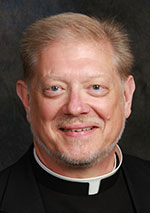That All May Be One / Fr. Rick Ginther
A time to reflect, pray and journal on the issue of privilege
 Privilege. It is a word currently much massaged here in United States.
Privilege. It is a word currently much massaged here in United States.
From my experience, its use is meant to call us to personal reflection. How are we a person of “privilege”? How do we experience it? Do we see ourselves in a privileged group? Do we see ourselves denied some basic dignity because we are not so privileged? As a priest for 37 years, I have kept a close eye on “clerical privilege.” It can be very real.
I have tried to live well beyond any sense of it in my ministry. It helps when I recall that I came from the pews in which parishioners, guests and neighbors sit. I was baptized and called to holiness like them. I am called to serve them as I have been served faithfully by so many.
As an ecumenist and promoter of interreligious dialogue, I know that religionists must come to grips with “religious privilege” in our own time and how it has played out in the history of our religious relationships
A few examples are warranted.
I gather with religions that are in the minority in our city each fall at the Festival of Faiths. While there, I represent a minority religion among the more predominant Christian denominations in our city. Yet I am privileged because I am a Catholic Christian. There is no need for me to justify why I am here. That is the stuff of privilege.
Growing up in medieval Europe, Catholicism was “privileged” as the dominant religion, driver of culture and daily living. All other religions were “lesser,” “suspect” or “dangerous.”
Growing up in the Ottoman Empire, Islam was privileged. True, there was some tolerance. But those who “could succeed” were Muslim; all others were lesser than.
In 16th century-England, Tudor privilege favored the Church of England to the detriment—even death—of folks who refused to change.
In Russia in the 19th century, Orthodoxy was “privileged.” All others were suspect (Catholicism, Judaism, Islam). They were even subject to massacres.
Wherever in the world today there is a majority religion in a country or region, there is often an accompanying “privilege.” It’s better for you if you are “of the majority.”
A friend of mine asked recently if the need to differentiate, to the point of diminishment of human value, is innate. I could not answer anthropologically, religiously or culturally.
I did say that there is clearly an identifiable tendency toward “them” vs. “us,” “better” vs. “lesser,” and “true” vs. “questionable.”
Every instance reveals that such dyads or hierarchies are human constructs. They do not recognize the commonality of our human being—of equal worth, of equal basic longings, needs and rights.
I have decided to study privilege this summer. I have lived, and yet live, both sides of the issue.
I grew up as a Catholic in the 1950’s in a majority Protestant neighborhood and city. “We” were often seen as “other” or “lesser,” especially at the hands of other youths and distrustful neighbors.
My neighborhood became racially mixed; my family stayed, embracing the diversity. We passed from being majority to minority. And in some youth’s eyes, we were not to be trusted.
Ironically, as a person of religious belief, I must now face a growing mass of secular voices that would silence religion in our society, reducing us to a mute minority.
You might gather that I relate well to minorities. I know how it feels to be “lesser.”
But I am white. I am privileged in this country.
I am Christian. I am privileged in this country.
I need to study. And reflect, pray, journal and be open to whatever rises in wisdom.
What shall you do these summer months?
(Father Rick Ginther is director of the archdiocesan Office of Ecumenism and Interreligious Affairs. He is also the pastor of Our Lady of Lourdes Parish, Indianapolis.) †
 Privilege. It is a word currently much massaged here in United States.
Privilege. It is a word currently much massaged here in United States.